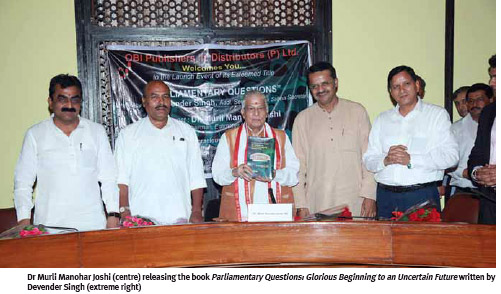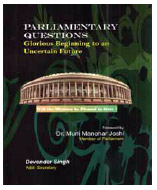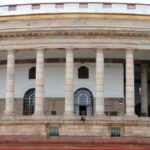- Cover Story
- Governance
- Globe Scan
- Corruption
- State Scan
- Talk Time
- Cover Story
- Governance
- Globe Scan
- Corruption
- State Scan
- Talk Time
Recent Posts
© Copyright 2007 - 2023 Gfiles India. All rights reserved powered by Creative Web INC.GovernanceThe question of the Question Hour
MURLI MANOHAR JOSHISeptember 6, 20157 Mins read466 Views
 Written by MURLI MANOHAR JOSHI
Written by MURLI MANOHAR JOSHITHE most important postulate about parliamentary democracy is that Parliament is between the government and the people. The government is accountable to the people and this accountability is secured by the people through their representatives in Parliament. Accountability is an important adjunct of government, irrespective of the form of democracy. If the government is democratic then it has to be accountable, otherwise, in my view, it will not be democratic to the extent it eschews accountability. It is an old adage that ‘the government of the people, for the people and by the people—shall not perish from the earth’. In the Indian context, I have added two things to it—provided free and fair elections, free from muscle and money power, are conducted and a sense of accountability prevails continuously in the government. Otherwise the government will become autocratic and aristocratic like any other one.
Responsibility and accountability have been ensured in our Constitution through various ways. Institutions have been put in place which track and monitor the functioning of government. Nowadays, it is the time of regulators which keep an eye on the functioning of the government. But, if we have to know what these regulators are doing, what type of impact they have, whatever is being said by the government, is real or just political rhetoric, to see whether the government is working properly, there is no way but asking questions. As a legislator, it is my prerogative to ask questions and to hold the government to account.
The most important and necessary thing is to maintain the freedom of asking questions in Parliament. If that freedom is restricted, then the importance of questions gets diminished. You know that there is an old aphorism that even gold shudders when it is put to test. When gold is put to test, it is put in the fire. ‘Kanp Gayo Dekh Pariksha Kal’. Therefore, Question Hour is a severe test, an ordeal by fire, for the hon’ble minister. It has happened in this very Parliament. And it continues in this way, and this book makes us vigilant that the system stays put. But, in our country, if the legislator asking the question is smart, the bureaucracy is smarter. Sometimes even if the question is clear and concise, the answer is curved and tangled. At times, it seems answers conceal more and reveal less. The bureaucracy is an expert in this art. To ask questions and to frame the questions is a big art in itself. Therefore, the device of questions is very important for all i.e. for the Members of Parliament and for the bureaucracy and for the minister also.
This lecture was delivered on the occasion of the release of the book, Parliamentary Questions: Glorious Beginning to an Uncertain Future, by Devender Singh, Addl Secretary in the Lok Sabha SecretariatSometimes big things tumble out from a small, innocuous looking question. When I became a Member of Parliament for the first time, there was a split between the government and the insurance and bank employees and they were on a strike. I just put a short notice question. The feature of short notice question is that it is accepted only with the consent of the minister. Many times, if there is a very important issue and the minister is running away from it, it creates misgivings and it is assumed that there is something fishy. But the minister of finance was very experienced. He accepted the question. As soon as he replied in the House, I just asked a question and he replied, “yes”. The strike was called off immediately. I had no inkling that a small question may have such a huge impact. I just want to say that there is huge potential and power in a question. We just need to know the art, how the language of a question is framed and how it is asked. At times, supplementary questions become more important than the original ones.
Questions are not new for us. As rightly observed by Dr Virendra Kumar, questions are not new to our country. Our civilisation begins with asking questions and expressing doubts. In our tradition, the first question is, ‘who am I, who art thou, wherefrom have we come, where will we go—‘Koaham Kasthvam Kut aayatam, Kome Janani Kome tatam’. At that time there was neither Parliament nor any similar institution. But these questions have been haunting us since time immemorial. Modern science and philosophy have not been able to answer these questions. Wherefrom this world has come? Who created it and how? Not only this, the power who created, does He know what He created and how He created it? Therefore it is inconceivable that there would be no questions in Parliament as Mr. Bhartruhari Mahatab rightly pointed out. We must use Question Hour which is for the benefit of the people. Our concern is how to save Question Hour. The book raises this concern. Its title, Parliamentary Questions – Glorious Beginning to an Uncertain Future, itself raises the apprehension that the future of parliamentary questions seems to be in doubt. I believe that the future of Question Hour will remain bright. It is true that in the situation today Question Hour seems to be under a cloud. The manner in which Question Hour was shifted to the later part of the day in the Rajya Sabha, I am worried that it might be relegated to six o’clock, at the end of the day. Then the only people remaining would be the MPs who put the questions and the ministers concerned, with the House remaining almost deserted. The best time for Question Hour is the beginning of the day, the position as obtains today in the Lok Sabha.
Personally, I feel that it should be scheduled at the beginning of the day because the events between today and yesterday must be replied to in the first hour when the House meets.
THE main reason for adjournment or constant disruption of Question Hour is that both the ruling party and the opposition are more interested in asserting their public posture rather than in the replies to questions or discussions on issues. It is not easy to make your mark through questions. If a question does not come up for oral reply and is instead marked for a written reply then it seems that your work has gone to waste. The MP would be interested in seeing that his question comes up for oral reply. The reply to oral questions is given in the House itself. Even then, sometimes the time gets over only in three or four questions. Then questions are asked about the importance of Question Hour itself. People say that if only three or four questions are taken up then what is the need for Question Hour; it is alright if it is scrapped, they say. Someone may feel that his question was eighth or ninth in line, the other person must have been at the head of the line, expecting his question to get an oral answer. So we have to take special care that questions listed for all the ministries in the list of questions for a day are taken up. Many times, it so happens that six questions from a single ministry are taken up and even a single question from other ministries is pushed to the back.
Is it possible at the time of ballot to decide about taking up questions from particular ministries and MPs, and also ensure through a second ballot that questions of different ministries are taken up in the early lot? At least five, seven or eight ministries should be covered so that the people are able to get the information they have sought. This aspect needs to be given earnest consideration.

Sometimes this issue is also raised, whether MPs put the questions on someone’s suggestion or they do so with their own intelligence and information. There is no objection on a question being asked on someone’s suggestion subject to the condition that there should be no vested interest behind it and it should have been asked only in the public interest. Long time ago (in 1951) it was alleged that Mr. Mudgal put up a question for pecuniary consideration and it was proved that the question had been put not in the public interest but there was some pecuniary interest. He was expelled and that was the first case of an MP being expelled. We have to take care of this aspect that the questions should be inspired entirely by public interest. Questions could be put as per personal knowledge, information given by another person, on the basis of newspaper reports, any suggestion regarding public interest but it should not become a means for furthering the personal interest of anyone. It is necessary to ensure this, and this has been mentioned in the book.
It is necessary to ensure that the Question Hour runs uninterrupted… The people and the democracy itself demand that it should be continued, it should be strengthened and it should be conducted every dayA question is a potent weapon available to the public representatives to use at the right time, in the right manner and for public good. Now, I will tell you my own experience. When I was a minister, most of the people used to sit quietly and as soon as they got to know that the question would come for an oral answer, they would become active. The rest of the time they passed in sifting information. Often, correct information is not given in written replies. The information given would be irrelevant. A person may keep on trying. Even for an oral question, the trend would be to provide information which would not entail taking of responsibility or which would contain no useful information. When I was MP, I found a way out of this problem. I selected questions of a similar nature out of the oral and written questions submitted during the previous eight or 10 years along with the replies given by the government thereto. When I started formulating questions based on the replies given to earlier questions, it disturbed the ministry concerned. I would advise all the honourable members to study the questions put up during the last four-five or two-three years and take up any one subject. You would be able to shake the bureaucracy out of complacence within two or three sessions. Hansraj Ahir (MP during the 15th Lok Sabha) is an example. ‘Coalgate’ came to light due to the questions only. This shows the power of questions.
It is necessary to ensure that Question Hour runs uninterrupted and without interference so that the full power of Question Hour is harnessed. People also say that some ministers are interested in avoiding oral questions to save themselves from accountability. The extent to which this charge is right or wrong will be judged only with the passage of time. But this is a charge hurled frequently. I hear from my journalist friends that many ministers who dread the questions do not want Question Hour to run. Whether or not the Ministers want it, the people of the country and democracy itself demand that Question Hour should be continued, it should be strengthened, it should be conducted every day and the House should sit for longer duration. We should bear in mind that security of the MPs is protected if Question Hour is protected.
Recent Posts
Related Articles
GovernanceNewsBackdoor entry of Private players in Railway Production Units ?
Written by K. SUBRAMANIAN To Shri G C Murmu C&AG Dear Shri Murmu,...
ByK. SUBRAMANIANFebruary 22, 2024GovernanceNailing Labour to The Cross
Written by Vivek Mukherji THEY grease the wheels of India’s economy with their...
ByVivek MukherjiMay 5, 2020GovernanceBig Metal Momentum
Written by GS Sood PRECIOUS metals especially gold and silver are likely to...
ByGS SoodMay 5, 2020GovernanceStrengthening Social Enterprise Ecosystem: Need for systemic support from the Government
Written by Jyotsna Sitling and Bibhu Mishra THE world faces several challenges today....
ByJyotsna Sitling and Bibhu MishraMay 5, 2020 - Governance
- Governance


























































